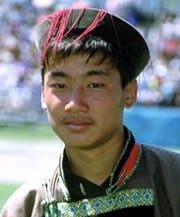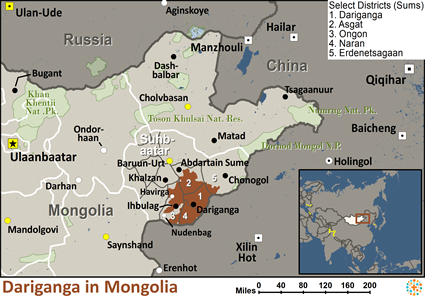The Dariganga, a small people group of Mongolian origin, inhabit the southeastern regions of Mongolia. They are primarily located in the southern part of the Sühbaatar province, on a volcanic plateau near the Gobi Desert. The Dariganga belong to the eastern group of Mongols, which includes the Khalka Mongols, the Buryat and most of the Chinese Mongols.
The Dariganga language is closely related to Halh and is often referred to as a Mongolian dialect. However, all Dariganga are also able to use Halh in conversation with other Mongols.
Urban Dariganga generally live in drab apartment complexes. Many of them have found jobs in industry, mining or transport. Although most Mongols now live in cities, there remains a large population of Dariganga nomads. They live in herding camps and migrate seasonally with their animals. Their dwellings are portable gers or yurts, which are round felt tents that have brightly painted wooden doors. The nomads raise horses, cattle, and sheep and migrate four or five times a year in search of fresh pastures. Some of the Dariganga are now settled farmers who live and work on the collective (community) farms.
Due to the harshness of the climate in Mongolia, the Dariganga diet consists primarily of fat, meat (mainly mutton), milk, and dairy products. They eat large amounts of fat and mutton during the winter, and dairy products such as yogurt, cheese and sour cream during the summer. Their favorite drink is airag or kumiss, which is fermented mare's milk.
The Dariganga traditionally married while they were very young. The girls were usually 13 or 14, and the boys were only a few years older. Today, couples usually marry while they are in their early to mid-twenties, and then immediately begin having children. Urban Dariganga, especially those with a college education, tend to delay marriage until they reach their late twenties. Birth control is discouraged in Mongolia. Families with six or more children are given financial benefits.
The Dariganga love music, folk dances, chess and sporting events. Every July, all Mongolians celebrate the ancient Naadam festival. A big part of the celebration involves the three favorite sports in Mongolia: horse racing, archery and wrestling.
The Dariganga were traditionally shamanists (believed in an unseen world of gods, demons, and spirits). The people depended on shamans (medicine men) to cure the sick by magic, communicate with the gods, and control events.
In the late 1500s, the Mongols were introduced to Tibetan Buddhism, and most Mongols converted to Buddhism at that time. By 1900, more than half of Mongolia's males were serving as priests in Buddhist monasteries. However, as a result of an anti-religious movement launched by the Marxist government in the 1930s, about three-quarters of the Dariganga became either non-religious or atheists.
Today, a number of Dariganga have returned to the beliefs of their forefathers. A combination of Buddhism and shamanism has survived, especially among the elderly. The Yeguzer Khatagtyn Monastery is the focal point of Buddhism in the Dariganga homeland. Likewise, shamans are once again called upon to cure the sick or alleviate evil spirits through divination, oracles and astrology. On many hilltops one can see obos, heaps of stones thought to be inhabited by local spirits.
Rape, murder, alcoholism and violence are major problems in Mongolia's urban areas today. Many young people are also involved in criminal gangs. The Dariganga need a spiritual revolution that will make them tire of this situation and seek the true holiness found only in Jesus Christ. The Lord has raised up several Mongolian missionaries to go to places Westerners cannot go. As it stands there has not yet been a harvest among the Dariganga people.
Pray that God's church in Mongolia would grow in deeper discipleship and greater missions vision.
Pray for freedom from alcoholism, violence, and divorce for the peoples of Mongolia.
Pray for hundreds of Dariganga people to put their faith in Christ leading to stronger families, better lives and a clear testimony of the Lord's power and goodness.
Pray for the Holy Spirit to give the Dariganga people teachable and understanding hearts.
Scripture Prayers for the Dariganga in Mongolia.
https://en.wikipedia.org/wiki/Dariganga_Mongols
https://people-groups.asiaharvest.org/Mongolia/Dariganga.pdf
| Profile Source: Joshua Project |

























